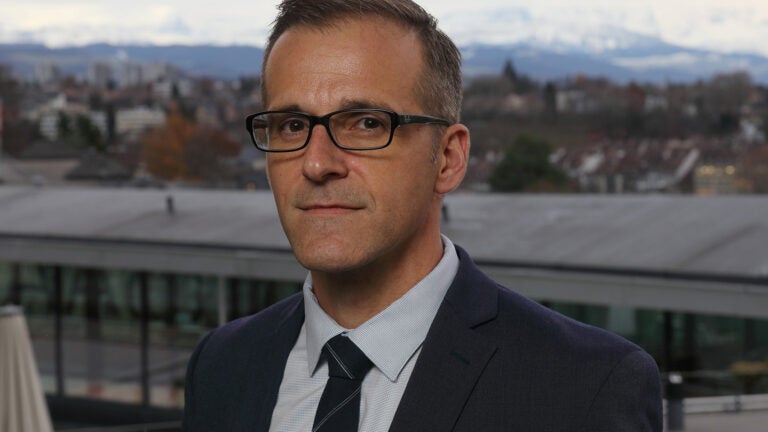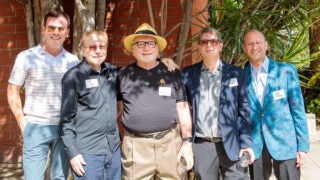
Robert Williams is the executive director of USC Shoah Foundation. (Photo/Tilman Renz)
The truth of the Holocaust is under attack — here is what we can do about it
On International Holocaust Remembrance Day, USC Shoah Foundation’s Robert Williams discusses the co-opting of historic events and how we — and social media companies — have a part in stopping the spread of lies about the atrocities.
USC Shoah Foundation is dedicated to developing empathy, understanding and respect through testimony, but it cannot alone counter the misinformation that distorts the truths of the Holocaust. The foundation’s new executive director, Robert Williams, spoke with writer Emily Gersema about the patterns of misinformation regarding the Holocaust, the co-opting of other historic events and how we — as well as the social media companies — have a part in stopping the spread of lies about the atrocities. We share that interview as International Holocaust Remembrance Day is observed today.
Experts in cybersecurity have been pointing out that misinformation and disinformation — fake news — are a growing threat to national security. Do experts on the Holocaust feel the same?
Historians, political scientists and other scholars have known for a long time that certain narratives (myths of heroes and victims, the deployment of racism) can be used to manipulate and radicalize people. The fascist movements of the 20th century excelled in this.
Today, the potential to do so might be even worse. In the European context, for example, certain aspects of Holocaust history have become operationalized for disinformation, that is, to misuse Holocaust themes for particular purposes or to paint a distorted picture of the past. This applies to the United States, too. Consider, for example, the number of anti-vaxxers and COVID protestors who misused Holocaust imagery and themes.
And of course, we have all the rhetoric and the propaganda coming from the Russian Federation about Ukraine being overrun by fascists, Nazis and antisemites. This sort of rhetoric, which increased after the Maidan revolution, has now been used as a partial justification for the invasion of Ukraine.
Holocaust disinformation has become a potential international security concern. And this is not just in Eastern Europe.
Robert Williams, USC Shoah Foundation
Holocaust disinformation has become a potential international security concern. And this is not just in Eastern Europe. Similar dynamics are at play between a few of the countries that used to be part of the former Yugoslavia, where rhetoric includes distorted pictures of the Holocaust and the atrocities of the 1990s.
Essentially, across Europe and in other parts of the world, you see selective views of history become a weapon used by political leaders, by ideologues and by extremists to sow discord, to undermine democracies and to exacerbate civil and interethnic tensions.
How much of this rise in misinformation about the Holocaust has to do with the distance of time, which allows people to more easily latch onto a historical event and the victims of that historical event as a way to mischaracterize or explain another issue?
The passage of time is certainly part of the equation. Because there are fewer and fewer Holocaust survivors, there are fewer and fewer people who can speak with real, lived authority. When there are no more survivors who can educate the public and say “stop” when it is needed, who will assume these responsibilities?
This is where the resources of USC Shoah Foundation come in. Our archive of audiovisual testimonies provides a permanent opportunity for the authentic voices of survivors and their memories of the past to serve as a bulwark against some of these trends. When supported by scholarship, by accessible educational resources, by engaging media and outreach, and by subject matter expertise, we at USC can help ensure that these historical events are not only protected from misuse, but also can inspire awareness and understanding that can lead to a better future.
What is the solution to misinformation? Should we prosecute hate speech? What would be prosecutable?
There are those who might say that the solution lies in curbing freedoms of speech. I disagree strongly. Indeed, I’m very much in favor of the First Amendment and believe that the solution lies in part in how we think of the power of speech.
We should strive to present the public with a broad range of information, analysis and news. In doing so, under ideal circumstances, the vast majority of people will be able to sort fact from fiction, realize that the world is not black and white and be aware and engage with the world around them in ways that are nuanced.
We are beset by more information than we know how to process, often presented in bite-size chunks without nuance … In such an environment, it becomes difficult to believe what one sees.
Robert Williams, USC Shoah Foundation
At the moment, though, we are beset by more information than we know how to process, often presented in bite-size chunks without nuance or understanding or even knowledge of the source from which a story comes. In such an environment, it becomes difficult to believe what one sees. As recent USC research has shown, the sharing of information can become simply habit. Information is a mere commodity, and factuality becomes irrelevant.
The scholarship and the work of USC Shoah Foundation and the university as a whole are based in fact, rest on empirical evidence and strive to present this to the public in ways to compel understanding and honesty. If people become better consumers of information and if they have some knowledge of the past and its relevance, they may very well encounter things that are counterfactual or lies or outright propaganda. But, properly equipped, they will also fall into that middle part of the bell curve, that is, an educated and engaged citizenry able to support a healthy society.
Do social media companies have a responsibility to end the spread of misinformation?
There are a lot of people pointing the finger at social media companies and saying they need to do something to clamp down on hate speech, Holocaust denial and other forms of disinformation. That is certainly a worthy enterprise, and in certain political-legal contexts (such as in parts of the EU) it is appropriate. Moreover, many social media companies have terms of reference, and there is a responsibility to enforce the rules that are in place.
But that is only half the equation. The other half of the problem is, quite frankly, us, the users of social media. We have to become better communicators because those who spread hate and lies have a head start. They can reach vulnerable groups more rapidly and effectively than most.
By 1984, before the birth of the World Wide Web (which happened in 1989), two online right-wing networks were using so-called bulletin board systems via telephone lines to spread Holocaust denial, antisemitism and other hateful content designed to propagandize and recruit. These were the Aryan Nation Liberty Net and the White Aryan Resistance Computer Terminal. In time, these gave way to other hate sites, such as the notorious Stormfront.org, Vanguard News and American Renaissance.
This online sphere of hate continued to grow and to innovate through hacking attacks, the coordination of messages across platforms and the development of disturbing subcultures that reach even more audiences. And this is not unique just to the extreme right — it is also seen in parts of the extreme left and among radicalized religious communities across the globe.
In other words, they’ve been ahead of us for too long. They’re better at playing to the passions of vulnerable audiences, and we need to become just as adept. That’s the best way to counter disinformation.
It would be interesting to see if Silicon Valley, let’s say, would work closer with USC and in cooperation with USC Shoah Foundation to develop awareness of the patterns by which hate content spreads online so that we can not only understand the problem better, but also develop the educational and outreach tools necessary to respond to disinformation in a more effective way.



